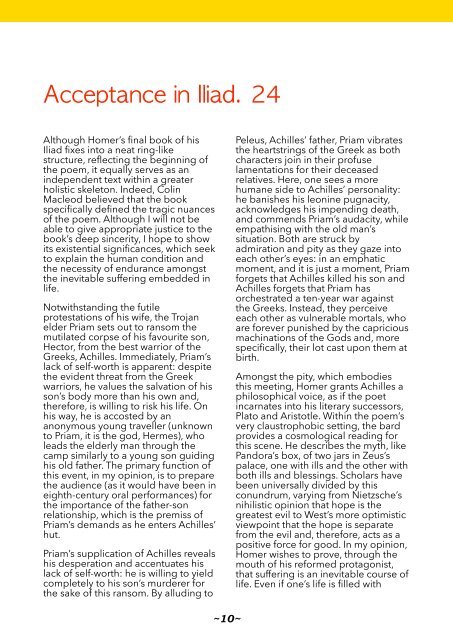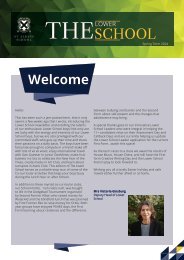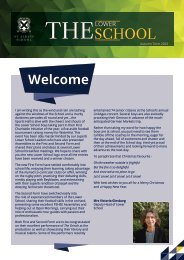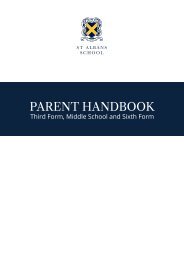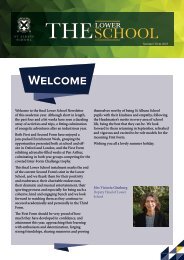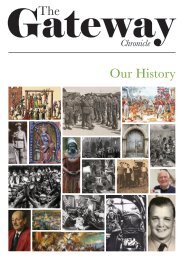Create successful ePaper yourself
Turn your PDF publications into a flip-book with our unique Google optimized e-Paper software.
Acceptance in Iliad. 24<br />
Although Homer’s final book of his<br />
Iliad fixes into a neat ring-like<br />
structure, reflecting the beginning of<br />
the poem, it equally serves as an<br />
independent text within a greater<br />
holistic skeleton. Indeed, Colin<br />
Macleod believed that the book<br />
specifically defined the tragic nuances<br />
of the poem. Although I will not be<br />
able to give appropriate justice to the<br />
book’s deep sincerity, I hope to show<br />
its existential significances, which seek<br />
to explain the human condition and<br />
the necessity of endurance amongst<br />
the inevitable suffering embedded in<br />
life.<br />
Notwithstanding the futile<br />
protestations of his wife, the Trojan<br />
elder Priam sets out to ransom the<br />
mutilated corpse of his favourite son,<br />
Hector, from the best warrior of the<br />
Greeks, Achilles. Immediately, Priam’s<br />
lack of self-worth is apparent: despite<br />
the evident threat from the Greek<br />
warriors, he values the salvation of his<br />
son’s body more than his own and,<br />
therefore, is willing to risk his life. On<br />
his way, he is accosted by an<br />
anonymous young traveller (unknown<br />
to Priam, it is the god, Hermes), who<br />
leads the elderly man through the<br />
camp similarly to a young son guiding<br />
his old father. The primary function of<br />
this event, in my opinion, is to prepare<br />
the audience (as it would have been in<br />
eighth-century oral performances) for<br />
the importance of the father-son<br />
relationship, which is the premiss of<br />
Priam’s demands as he enters Achilles’<br />
hut.<br />
Priam’s supplication of Achilles reveals<br />
his desperation and accentuates his<br />
lack of self-worth: he is willing to yield<br />
completely to his son’s murderer for<br />
the sake of this ransom. By alluding to<br />
Peleus, Achilles’ father, Priam vibrates<br />
the heartstrings of the Greek as both<br />
characters join in their profuse<br />
lamentations for their deceased<br />
relatives. Here, one sees a more<br />
humane side to Achilles’ personality:<br />
he banishes his leonine pugnacity,<br />
acknowledges his impending death,<br />
and commends Priam’s audacity, while<br />
empathising with the old man’s<br />
situation. Both are struck by<br />
admiration and pity as they gaze into<br />
each other’s eyes: in an emphatic<br />
moment, and it is just a moment, Priam<br />
forgets that Achilles killed his son and<br />
Achilles forgets that Priam has<br />
orchestrated a ten-year war against<br />
the Greeks. Instead, they perceive<br />
each other as vulnerable mortals, who<br />
are forever punished by the capricious<br />
machinations of the Gods and, more<br />
specifically, their lot cast upon them at<br />
birth.<br />
Amongst the pity, which embodies<br />
this meeting, Homer grants Achilles a<br />
philosophical voice, as if the poet<br />
incarnates into his literary successors,<br />
Plato and Aristotle. Within the poem’s<br />
very claustrophobic setting, the bard<br />
provides a cosmological reading for<br />
this scene. He describes the myth, like<br />
Pandora’s box, of two jars in Zeus’s<br />
palace, one with ills and the other with<br />
both ills and blessings. Scholars have<br />
been universally divided by this<br />
conundrum, varying from Nietzsche’s<br />
nihilistic opinion that hope is the<br />
greatest evil to West’s more optimistic<br />
viewpoint that the hope is separate<br />
from the evil and, therefore, acts as a<br />
positive force for good. In my opinion,<br />
Homer wishes to prove, through the<br />
mouth of his reformed protagonist,<br />
that suffering is an inevitable course of<br />
life. Even if one’s life is filled with<br />
blessings and utmost joy, the ill of<br />
death, which looms over all helpless<br />
mortals, renders this happiness to an<br />
inevitable end.<br />
Despite their grief, Achilles<br />
encourages Priam to eat, citing the<br />
myth of Niobe, who ate after the<br />
slaughter of her children owing to her<br />
hubris. This has a three-fold<br />
significance: firstly, it adds an<br />
articulate edge to Achilles’ persona,<br />
almost meta-poetically elevating the<br />
son of Peleus to the form of the poet.<br />
This proffers more gravitas to his<br />
speech and, as such, its contents.<br />
Secondly, it confirms Achilles’ return to<br />
humanity as he provides customary<br />
food and drink to a guest, albeit a foe.<br />
Thirdly, and most importantly, it<br />
teaches one the value of<br />
perseverance: the presence of grief<br />
should not distract one from the<br />
necessities of survival and endurance.<br />
On the contrary, one should learn to<br />
live with these emotions, comprehend<br />
one’s inability to contain a world<br />
pervaded with uncontrollable forces,<br />
and accept that suffering, injustice,<br />
and inequality are inescapable<br />
courses of life.<br />
However, ultimately, the most<br />
profound element of this book is its<br />
brevity: the scene is a short hiatus<br />
from the trauma of war, where<br />
partialities are absolved, and the<br />
meaning of life can be perceived<br />
objectively. Indeed, ironically, and<br />
rather poignantly, it is the hope that a<br />
resolution between the sides will be<br />
formed, which encapsulates the<br />
tragedy within the text. After twelve<br />
days of mourning, the fighting will<br />
resume, Priam will be slaughtered in<br />
his palace, Troy will be consumed by<br />
fire and, crucially, Achilles will meet his<br />
premature end. The death of the<br />
Greek hero, the quasi-philosopher of<br />
Iliad. 24, proves the inescapability of<br />
one’s fate; his conscious decision to<br />
choose an early but glorious death,<br />
outlined earlier in the poem, shows<br />
that he accepts this inevitability. He<br />
accepts that a short but heroic life is<br />
better than a long but insignificant<br />
one.<br />
Iliad. 24 offers a pause for reflection<br />
where, amongst the acrimony of war,<br />
sufferer and sufferer can unite in their<br />
grief, caused by divine will and human<br />
pride. I believe that Iliad. 24 teaches<br />
one that complete happiness is<br />
unattainable; in fact, I would argue<br />
that such a disposition indicates one’s<br />
obliviousness to the harsh realities of<br />
existence. Instead, by learning to<br />
accept the fickle tendencies of a<br />
mortal life, to value those cherished<br />
friendships and relationships, and to<br />
endure those inevitable hardships will<br />
facilitate a life of self-contentment.<br />
Achilles and Priam provide an<br />
exemplum of this acceptance: they are<br />
aware of these existential injustices<br />
and, in a didactic way, teach us to live<br />
our lives to the full before we<br />
ourselves succumb to death.<br />
Mr E Baker<br />
~10~ ~11~


